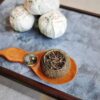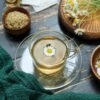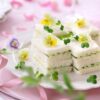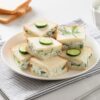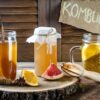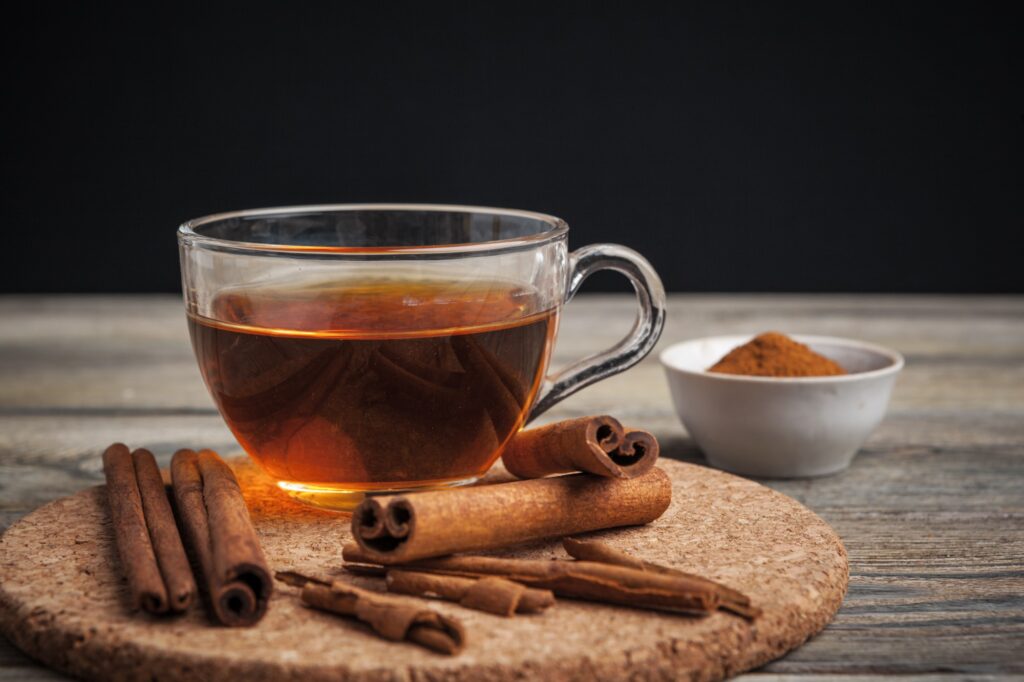
In the realm of tea blends, some combinations are truly magnificent. And one such pairing that will delight your senses is the union of black tea and cinnamon. The robust and earthy flavor of black tea, balanced with the warm and aromatic notes of cinnamon, creates a symphony of taste that is both comforting and invigorating.
Black tea, known for its bold and malty taste, provides a strong and flavorful base for this delightful concoction. The addition of cinnamon infuses the blend with its distinct sweet and spicy profile, enhancing the overall taste experience. Together, they create a harmonious blend that is perfect for all tea enthusiasts.
Not only does this combination taste exquisite, but it also offers a range of health benefits. Both black tea and cinnamon are rich in antioxidants, which can help boost immunity and fight inflammation. They have also been linked to improved heart health and better blood sugar control.
So, whether you’re seeking a comforting cup to enjoy on a chilly day or a beverage that both satisfies and nourishes, the perfect blend of black tea and cinnamon is sure to deliver.
The History and Origins of Black Tea and Cinnamon
Black tea has a rich history that dates back thousands of years, originating from China where it was first cultivated and consumed for its bold and full-bodied flavor. Over time, black tea gained popularity across the globe, becoming a staple in various cultures and traditions. Cinnamon, on the other hand, has a long history of use as a spice and medicinal herb, prized for its sweet and spicy flavor profile. Its origins can be traced back to ancient Egypt, where it was highly valued and often used in embalming rituals.
The combination of black tea and cinnamon likely emerged as a result of the desire to enhance the taste and aroma of tea, creating a more complex and satisfying beverage. This pairing brings together the best of both worlds – the depth of black tea and the warmth of cinnamon – to create a blend that is truly exceptional. Whether enjoyed hot or cold, this duo offers a sensory experience that transcends borders and cultures, appealing to tea lovers worldwide.
The fusion of black tea and cinnamon is not only a delicious culinary innovation but also a reflection of the rich histories and traditions associated with these two ingredients. As you savor a cup of black tea infused with cinnamon, you are not just enjoying a beverage; you are immersing yourself in a centuries-old tradition that has stood the test of time. The perfect blend of black tea and cinnamon is a tribute to the culinary ingenuity of our ancestors and a testament to the enduring appeal of these timeless ingredients.
Health Benefits of Black Tea and Cinnamon
One of the most compelling reasons to indulge in the perfect blend of black tea and cinnamon is the array of health benefits that these two ingredients offer. Black tea is renowned for its high concentration of antioxidants, particularly catechins and theaflavins, which have been shown to have anti-inflammatory and immune-boosting properties. These antioxidants help protect the body against oxidative stress and may reduce the risk of chronic diseases.
Cinnamon, with its potent compounds such as cinnamaldehyde and cinnamic acid, also boasts impressive health benefits. Studies have suggested that cinnamon may help lower blood sugar levels, improve insulin sensitivity, and reduce inflammation. Additionally, cinnamon is rich in polyphenols, which have antioxidant and antimicrobial properties, further contributing to its health-promoting effects.
When black tea and cinnamon are combined, their health benefits are amplified, offering a potent blend of antioxidants, anti-inflammatory compounds, and other bioactive substances that support overall well-being. By incorporating the perfect blend of black tea and cinnamon into your daily routine, you can not only enjoy a delicious beverage but also harness the healing power of these natural ingredients to promote longevity and vitality.
Flavor Profile of Black Tea and Cinnamon
The flavor profile of the perfect blend of black tea and cinnamon is a delightful combination of boldness and warmth, complexity and sweetness. Black tea, with its rich and malty undertones, provides a robust base that is complemented by the sweet and spicy notes of cinnamon. The result is a harmonious fusion of flavors that tantalize the taste buds and linger on the palate.
When brewed together, black tea and cinnamon create a sensory experience that is both familiar and exotic. The earthy richness of black tea mingles with the warm and aromatic essence of cinnamon, creating a symphony of taste that is both comforting and invigorating. Whether enjoyed plain or with a touch of honey or milk, the perfect blend of black tea and cinnamon offers a versatile flavor profile that can be customized to suit individual preferences.
The combination of black tea and cinnamon is a testament to the art of blending flavors to create a harmonious whole. Each sip reveals new layers of complexity, with the boldness of black tea balancing the sweetness of cinnamon, resulting in a truly exquisite taste experience. Whether you prefer your tea strong and robust or subtle and spiced, the perfect blend of black tea and cinnamon offers a versatile flavor profile that is sure to please even the most discerning palate.
How to Brew the Perfect Cup of Black Tea with Cinnamon
Brewing the perfect cup of black tea with cinnamon requires a delicate balance of time, temperature, and technique to extract the optimal flavors from both ingredients. To begin, select a high-quality black tea that complements the sweet and spicy notes of cinnamon, such as Assam or Ceylon. Similarly, choose a fragrant and fresh cinnamon variety, whether in stick or powdered form, to enhance the aroma of the blend.
Start by boiling fresh, filtered water to the recommended temperature for black tea, typically around 200-212°F (93-100°C). Place the black tea leaves in a teapot or infuser, ensuring that the leaves have ample space to unfurl and release their flavors. Add a cinnamon stick or a pinch of cinnamon powder to the pot, adjusting the amount according to your taste preferences.
Steep the black tea and cinnamon blend for the recommended time, usually 3-5 minutes depending on the type of black tea and desired strength. Avoid oversteeping, as this can result in a bitter taste. Once the steeping time is complete, strain the tea into cups or mugs, savoring the rich aroma that wafts from the pot. You can enjoy the tea as is or add a touch of honey, milk, or lemon to enhance the flavors.
Experiment with different brewing methods and proportions to find the perfect balance of black tea and cinnamon that suits your palate. Whether you prefer a stronger tea with a pronounced cinnamon flavor or a milder brew with subtle hints of spice, the key is to adjust the brewing parameters to achieve the desired taste profile. With practice and a spirit of exploration, you can master the art of brewing the perfect cup of black tea with cinnamon, creating a beverage that delights the senses and warms the soul.
Popular Recipes and Drinks Featuring Black Tea and Cinnamon
The versatility of black tea and cinnamon lends itself to a wide range of recipes and drinks that showcase the unique flavor profile of this exquisite pairing. From traditional chai blends to modern twists on classic beverages, there are endless possibilities for incorporating black tea and cinnamon into your culinary repertoire. Here are a few popular recipes and drinks that highlight the delightful union of these two ingredients:
- Chai Latte: A comforting and aromatic beverage made with steeped black tea, milk, cinnamon, and a blend of warming spices such as cardamom, cloves, and ginger. Sweetened with honey or sugar, this creamy chai latte is perfect for cozy evenings or chilly mornings.
- Cinnamon Black Tea Smoothie: A refreshing and nutritious smoothie that combines brewed black tea, frozen bananas, cinnamon, Greek yogurt, and a drizzle of maple syrup. Blended to creamy perfection, this smoothie is a delicious way to start your day or refuel after a workout.
- Cinnamon Spice Cookies: Soft and chewy cookies infused with black tea leaves and ground cinnamon, creating a fragrant and flavorful treat that pairs perfectly with a cup of tea. These cookies are a delightful snack for tea time or a festive dessert for special occasions.
- Iced Black Tea with Cinnamon Syrup: A cooling and invigorating drink made by brewing black tea and chilling it over ice, then sweetening with a homemade cinnamon syrup. Garnished with a cinnamon stick or a sprinkle of ground cinnamon, this iced tea is a refreshing thirst quencher on hot summer days.
By incorporating black tea and cinnamon into your culinary creations, you can explore the endless possibilities of flavor combinations and textures that this dynamic duo has to offer. Whether you prefer your beverages hot or cold, sweet or spicy, there is a recipe featuring black tea and cinnamon that is sure to tantalize your taste buds and elevate your dining experience.
Black Tea and Cinnamon in Different Regions
The cultural significance of black tea and cinnamon extends far beyond their culinary uses, playing important roles in various rituals, traditions, and ceremonies in different regions around the world. In countries such as China, India, Sri Lanka, and Morocco, black tea is deeply ingrained in the social fabric, symbolizing hospitality, respect, and connection. Similarly, cinnamon holds a special place in the cultural practices of countries like Indonesia, Sri Lanka, and India, where it is used in religious ceremonies, culinary creations, and traditional medicines.
In China, the birthplace of tea, black tea is revered for its history and craftsmanship, with elaborate tea ceremonies that highlight the art of tea preparation and consumption. Cinnamon, often imported from countries like Sri Lanka and Vietnam, is used in Chinese cuisine to add warmth and depth to savory and sweet dishes alike. Together, black tea and cinnamon create a sensory experience that is deeply rooted in Chinese culture, reflecting the harmony between nature and tradition.
In India, black tea is synonymous with chai, a spiced tea blend that is enjoyed throughout the day and served to guests as a gesture of hospitality. Cinnamon, known as “dalchini” in Hindi, is a key ingredient in masala chai, a fragrant and aromatic tea that combines black tea with a medley of spices including cinnamon, cardamom, cloves, and ginger. This iconic beverage is a symbol of togetherness and community, bringing people together over a steaming cup of spiced tea.
Sri Lanka, formerly known as Ceylon, is renowned for its production of high-quality black tea, particularly the famous Ceylon tea that is prized for its bright flavor and brisk character. Cinnamon, which grows abundantly in Sri Lanka, is a staple spice in the country’s cuisine and traditional medicine. The pairing of black tea and cinnamon reflects the island’s rich cultural heritage and agricultural abundance, creating a blend that is both flavorful and symbolic.
Morocco, in North Africa, has a long-standing tradition of serving mint tea, a blend of green tea, fresh mint, and sugar that is brewed and poured from a height to create a frothy layer. While not traditionally combined with cinnamon, black tea in Morocco holds a special place in social gatherings and hospitality rituals, symbolizing warmth and friendship. The addition of cinnamon to Moroccan tea would create an intriguing fusion of flavors that pays homage to both Moroccan and global tea cultures.
By exploring the cultural significance of black tea and cinnamon in different regions, we gain a deeper appreciation for the diversity and richness of tea traditions around the world. Whether enjoyed in a formal tea ceremony in China, as masala chai on a bustling street in India, as Ceylon tea in a quaint tearoom in Sri Lanka, or as mint tea in a bustling souk in Morocco, the perfect blend of black tea and cinnamon transcends borders and languages, connecting people through the shared love of tea and spices.
The Best Black Teas and Cinnamon Varieties to Try
When it comes to selecting the best black teas and cinnamon varieties for your perfect blend, quality and flavor profiles play a crucial role in creating a memorable tea experience. Here are some recommendations for black teas and cinnamon varieties that are sure to elevate your tea-drinking experience and awaken your senses:
Best Black Teas:
- Assam Black Tea: Known for its bold and malty flavor, Assam black tea hails from the Assam region in India and is ideal for those who enjoy a strong and robust cup of tea.
- Darjeeling Black Tea: Often referred to as the “Champagne of Teas,” Darjeeling black tea from India has a delicate and floral taste with muscatel notes, perfect for afternoon sipping.
- Keemun Black Tea: A Chinese black tea with a rich and smoky flavor profile, Keemun tea offers a unique depth and complexity that pairs well with cinnamon and other spices.
Best Cinnamon Varieties:
- Ceylon Cinnamon: Also known as “true cinnamon,” Ceylon cinnamon from Sri Lanka is prized for its sweet and subtle flavor profile, making it a versatile spice for both sweet and savory dishes.
- Cassia Cinnamon: A more common variety of cinnamon, cassia cinnamon is known for its strong and spicy flavor, adding warmth and depth to teas, baked goods, and savory dishes.
- Saigon Cinnamon: Hailing from Vietnam, Saigon cinnamon is highly aromatic and has a bold and intense flavor that lends itself well to robust black teas and spiced beverages.
By exploring different black teas and cinnamon varieties, you can create unique flavor combinations and sensory experiences that cater to your personal preferences and taste preferences. Whether you opt for a bold Assam black tea with cassia cinnamon for a robust brew or a delicate Darjeeling black tea with Ceylon cinnamon for a more nuanced flavor profile, the key is to experiment and discover the perfect blend that resonates with your palate.

